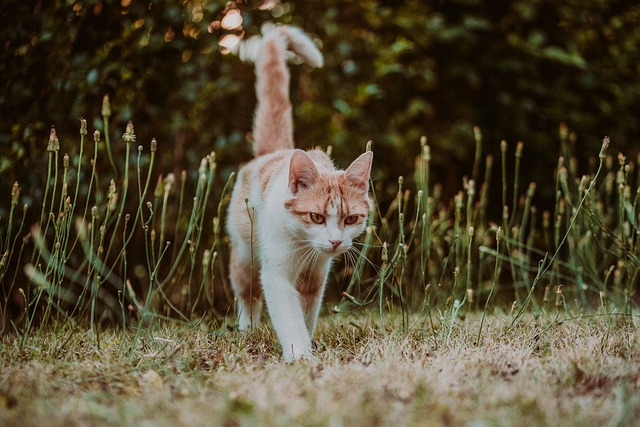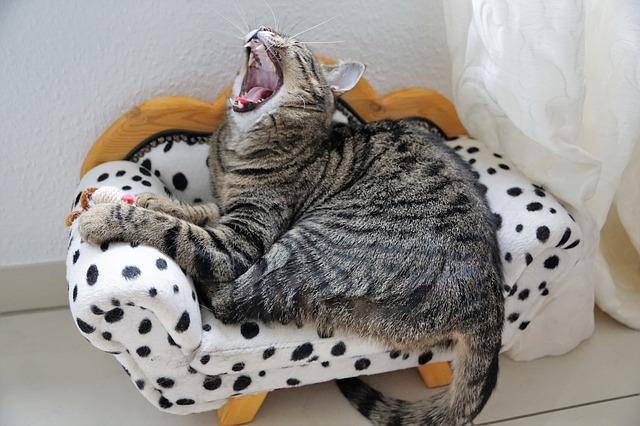Male cats usually exhibit certain behaviors during breeding seasons. They spray, yowl, and can become restless when sexually aroused.
Some of these behaviors can be annoying, especially to new cat owners.
Responsible cat parents should, therefore, understand what to expect, how long the process will last, and some of the best practices during this period.
To help you understand your tomcat’s behaviors better, here is what you need to know about the seemingly misunderstood male cat ‘heat cycle’:
How Long Does A Male Cat Stay In Heat?
Though it’s believed that both female and male cats go in heat, the males don’t undergo a heat cycle.
On the contrary, tomcats are ready to mate all the time (or throughout the year).
Once they reach full maturity (usually about 6 months), they will be ready to mate anytime the female cat can allow it.
So, your tomcat will only be aroused when he senses the signs of female cats in heat—usually by smelling their vaginal scents or urine sprays.
And when he does, he may act crazy like an insatiable maniac—this is what most male cat owners confuse with ‘being in heat.’
While tomcats will always be ready to mate, studies indicate that they do have subtle cyclic patterns.
For instance, their sexual activity cycle often peaks in the spring and dips during the late fall in the Northern Hemisphere (the females are also non-receptive during this period).
During the latter period (low point), your tomcat may be less eager to mate.
If you are planning to carry a breeding operation during this period, expect some difficulties because it is quite daunting to keep your tomcat vigorous.
When your male cat isn’t interested in mating, therefore, don’t assume that he’s not in heat! Probably, it is his sexual activity cycle that is working against him.
It is also worth noting that male cats will often show sexual interests beyond their mating capabilities.
So, even though their reproductive functions may decrease with age, they will still display sexual desire.
How Can You Tell When Your Male Cat Is in ‘Heat’?
While male cats don’t experience the heat cycle like the female cat, they exhibit some heat-like symptoms, which may include:
- Restlessness
- High vocalizations, most especially at night
- Spraying
- Excessive affection towards humans and other animals
- Aggressive acts
- The male cat will make several attempts to escape
- Licking sensitive regions on their body
- Leaving marks on people and things by rolling around or rubbing their head or buttocks on them.
These signs and symptoms may not explicitly mean that your pet is in ‘heat’.
You’ll need to pay rapt attention to them as spraying may be a symptom of urinary tract infection.
Aggression, vocalization, and attempting to escape can also be associated with stress, hunger pangs, and worry.
Excessive licking may indicate that the male cat is in pain. If you’re not sure of the breeding signs, contact your vet for a proper diagnosis.
How Do You Calm a Male Cat in ‘Heat’?

It’s quite an arduous task trying to calm your aroused male cat, especially when female cats surround him or you have a female cat around your home.
So, what can you possibly do to calm your pet?
Below are some tips that will be helpful:
1. Neutering
Neutering is the act of castrating a male cat. It’s the best way to calm your tomcat.
In neutering your cat, you’ll need to administer general anesthesia and make an incision on both sides of the scrotal sac to remove each testicle.
There are some behavioral patterns associated with neutered male cats.
You’ll notice that your tomcat will less likely to roam or respond to females in their breeding season.
Neutered males are less aggressive and show low sexual interest.
2. Isolate Your Male Cat from the Females
Do you have both male and female cats in your home?
Separate the tomcat from the females once it starts exhibiting heat-like symptoms.
If both cats are allowed to live together, they will become wild and end up mating.
3. Alter His Daily Routine
Another way to curb sexual arousal in your tomcat is by modifying their daily routine. Here are a few ways to do this:
I. Create a Comfortable Environment for Your Cat
Make your cat feel comfortable by building cat trees, shelves, and perches where they can rest and play.
Elevate their play experience by creating hide spots in between sofas and boxes among others.
A stimulating and lively environment will stir up playful instincts in your pet, reducing restlessness and untoward behavior.
II. Engage Your Cat in Exercise
One great way to reduce sexual energy in your cat is by engaging him in fun activities.
Typically, cats love playing, and they exert energy and devote a significant amount to it.
You can even take some time out to play with your tomcat.
Playing makes male cats calmer during their heat period. An ideal play item is a catnip, which makes your pet relax.
Related Post: 7 Best Refillable Catnip Toys for Cats
4. Contact the Veterinarian
Several drugs are available for calming your restless male cat, though this should be used under a veterinarian’s guidance.
Never forget that cats can be in heat for a long time, so medication may not be a panacea for mating season.
Do Male Cats Make Noise When In Heat?
The short answer is: Yes. Female cats do make strange noise (sequence of trills, meows, and trill meows) when they are in heat to alert males in the surrounding area that they are ready to mate.
In turn, males respond to the signals with similar strange noises to make the queens know that they heard the call, are available, and ready to mate.
Wrapping Up
The heat period can be a bit difficult for first-time cat owners due to weird behaviors that cats can display.
Hopefully, this post has shed some light to some of the most common concerns male cat owners have as far as mating behaviors of their pets are concerned.
Generally, patience is key when dealing with mating issues and other seasonal feline behaviors.
And if you don’t want to have litters of kittens hovering around your home, reach out to your local vet for a possibility of sterilization.
You will save yourself a whole lot of stress!
Related Posts:
Do Cats Get Pregnant Every Time They Mate?
Can Cats Be Sexually Attracted To Humans?
Do Cats Stay in Heat After Mating?
How to Stop a Cat in Heat from Meowing (9 Simple Ways)

Hi! I am Eleanor Price. I started this website after my cat, Louie, almost died from a case of botulism (a type of food poisoning often caused by bacteria that grow on food items). Turned out that my cat’s diet was the problem. I have made it my duty to provide the best information and recommendations about everything cat lovers need to know about their felines’ health and wellbeing. My goal is to find the most informative content on anything feline-related and share it with fellow hardworking kitty lovers.

